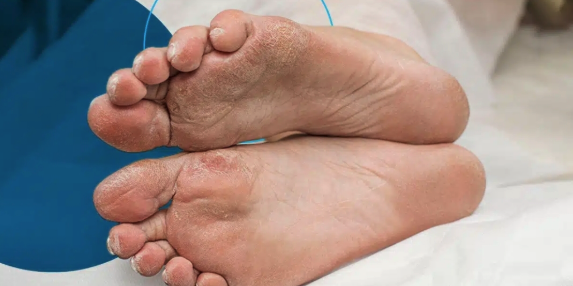
16 Sep The Connection Between Diabetic Wound Care and Overall Health
Managing diabetes involves monitoring many aspects of your health, including how your body heals. A small cut or blister can present challenges for a person with diabetes. Proper diabetic wound care is a key part of maintaining your overall well-being. Understanding the link between how a wound heals and your general health can help you take proactive steps. This awareness promotes a healthier life by preventing minor issues from escalating into larger problems.
How Does Healing Affect Health?
The body’s ability to heal is a complex process that reflects your internal health. For individuals with diabetes, diabetic wound care becomes especially significant as high blood glucose levels can slow down the natural healing process. Elevated sugar stiffens blood vessels and narrows arteries, reducing blood flow. Good circulation is key for healing since blood delivers oxygen and nutrients to repair tissues.
Slow-healing wounds are more than just a surface-level issue; they can signal underlying health complications. Nerve damage, a potential result of long-term high blood sugar, often reduces sensation, particularly in the feet. This can cause small injuries to go unnoticed and worsen over time. Proper diabetic wound care is necessary to manage such wounds, as persistent injuries can strain your body’s resources, lower energy, and weaken your ability to fight off other illnesses.
Why Is Wound Care Necessary?
Prompt and correct care for any break in the skin helps prevent complications. For people with diabetes, this process is a meaningful part of self-care. Attending to wounds properly from the start supports the body’s healing mechanisms and helps protect you from more serious health concerns. It is a practical way to stay on top of your health.
Taking specific steps can help manage a wound effectively. These actions are designed to keep the area clean and protected, providing the best environment for healing.
- Preventing Infection: Cleaning a wound and applying a sterile dressing creates a barrier against harmful bacteria.
- Promoting Faster Healing: Proper care, including keeping the wound moist and covered, can support tissue repair.
- Reducing Complication Risks: Addressing wounds immediately helps avoid the development of ulcers or more severe conditions.
Good diabetic wound care is about being attentive to your body. By regularly checking your skin, especially your feet, you can catch any issues early. This simple habit can make a significant difference in your long-term health and mobility. Taking care of small injuries is a direct way to support your body’s overall wellness.
What Risks Come With Infection?
An untreated or poorly managed wound can become infected. When you have diabetes, your body may have a harder time fighting off an infection, allowing it to spread. An infection places stress on your entire system and can even affect your blood sugar levels, making them more difficult to manage. Recognizing the signs of infection, such as redness, swelling, or warmth, is a step toward getting the right attention.
An untreated infection can lead to more severe health issues. These problems can impact your quality of life and may require extensive medical intervention.
- Cellulitis: A bacterial skin infection that can cause redness, pain, and swelling, potentially spreading to other parts of the body.
- Osteomyelitis: An infection that travels to the bone, which can be difficult to treat and may require long-term antibiotics or surgery.
- Sepsis: A life-threatening response to infection where the body’s immune system goes into overdrive, potentially causing organ damage.
Staying vigilant about wound care helps you steer clear of these risks. If a wound isn’t healing or shows signs of infection, it is useful to seek guidance from a healthcare provider. Early action is a practical measure to protect your health.
Manage Your Diabetic Wound Care
Taking charge of your diabetic wound care is necessary for your overall health. Simple, consistent actions can prevent complications and give you more control over your well-being, helping you maintain mobility and independence. A proactive approach allows you to address minor issues before they worsen. Work with your healthcare team to develop a personalized wound care plan, including checking your feet and treating minor injuries, and know when to seek professional help. These steps empower you to live a healthier life with diabetes.

No Comments